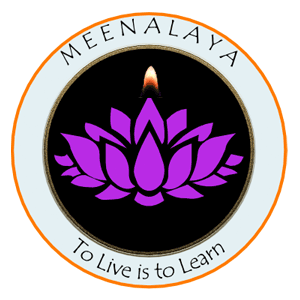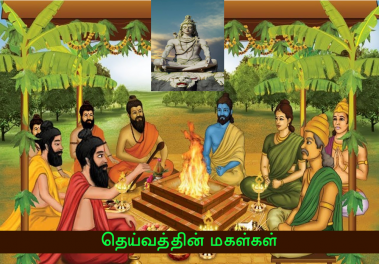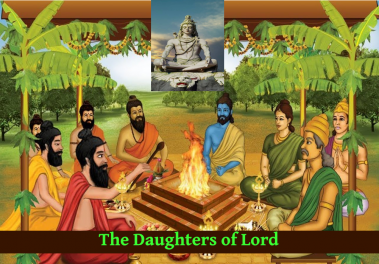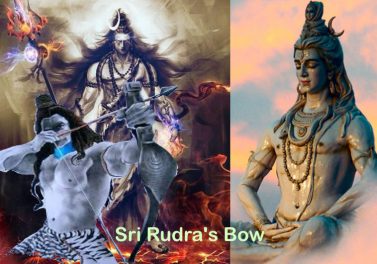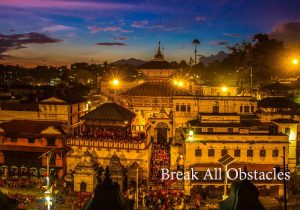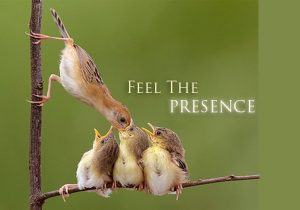Why is this Puja
Conversation with Aiya (1)
Before I could answer, Keerti, our daughter exclaimed, ‘Oh, it is the celebration when the Vinayakar Idol is worshipped and submerged in the sea, a big gala festival in Mumbai, is it not?’
‘Yes’, I said, adding quickly, as if there is a need to stress the importance, ‘When you do the pooja, you will get want you want in life’.
Kavya, her elder sister also joined the conversation. ‘I think only in the Hindu religion, there are festivals almost every month’.
I did not respond as she continued….
‘Dad, tell me why we do such Pujas? As you say only by doing our work and putting effort, we get results. So instead of just getting on with our efforts towards our goals, why do we have to do Puja?’
‘Effort alone does not create the required effect, Kavya. There are things that could intervene in our efforts and impact the results. Prayers and Pujas help us to overcome such situations, especially the worship of Lord Vinayaka.’
I know my response was inadequate so I looked up, as if expecting of her next set of questions. She kept quiet but Keerti came to her support.
‘Dad, do prayers really help? In a race, if everyone is praying to win, still there could be only one winner… Does it not prove that only our efforts matter?’
Such exchanges are quite normal at home.
I am sure parents do encourage children to ask questions. Questioning is essential for learning. I believe, especially for the spiritual understanding, questioning is an important means to learn. When someone asks a question, it is not just because there is a lack of knowledge; it is also because there is some level of knowledge.
Gone are the days when children can simply take the words of parents as the dictum; these days, they have incredible access to information and so also the challenge of choosing the right from the wrong. I find their curiosity almost, always genuine; their approach may appear to be forthright and doubting, but their desire to know is often deeper.
So I was happy with the discussion.
Before I could answer, the doorbell rang.
There was Aiya, a good friend of us. What a pleasant and timely surprise it was!
Aiya has been a personal friend for many years, yet I cannot say that I know him fully. As a senior scientist, he travels widely; at every opportunity he would be in India just to wander across the land as if he has no purpose in life and at the same time, as a determined seeker who knows his wants.
Aiya must be of same age as me, but I see him slightly mature in looks, and definitely wiser with words. He visits us often; sometimes, I go out looking for his company, because with him, there is always some immense discussion on profound topics. His warmth is open to all; to him, a child or a great scholar is of no difference, he would treat them all the same.
In his inexplicable charm, there is also some mystery. Once he told me that he would soon embark on an ‘incredible journey’. Neither he cared to explain it, nor did I dare to ask.
‘Welcome Aiya, Good to see you again. It is good timing…. Children are just questioning the purpose of prayers, pooja etc.’
‘Well, then you must learn to answer them’, said Aiya, as he was removing his shoes.
We went inside.
‘Hi Uncle, we were just talking about the Vinayakar Puja. As I was always told that only through actions we achieve, how can prayers give what we want?’ asked Kavya.
‘Absolutely right, who said prayers give you what you want…’ replied Aiya.
I looked little bit embarrassed, but Aiya came to my rescue. ‘Prayers do not give what you want…… but will lead you to what you really need’.
There was a pause before Aiya continued.
‘Karma is the word for action in Sanskrit. There are other meanings too but for now, let us stick with this. As you said, actions or karma alone give results. So no one should seek the benefits without performing karma’.
‘But, uncle, babies don’t perform any action, but get whatever they need from their mothers… Where is karma then?’ it was Keerti’s turn.
‘Babies seem to enjoy from the actions of their mothers’ I said.
There was a pause.
‘Don’t you know that not all children get such care of a mother? Some are orphans… some parents may not have the means to support even the basic needs of their children…’
As Aiya was saying, Keerti interrupted, ‘Uncle, you are going to say that some children are lucky and some unlucky….yes?’
‘Well, I do not want to use the word luck, but there is another Sanskrit word which we use frequently in Tamil as if it means luck…. adirshtam.’
I injected, ‘Children, perhaps you remember that we learnt the word before. Adirshtam is that which is not seen’.
They nodded.
‘Are you saying if someone gets benefit without any effort on his own, that benefit is his adirshtam?’ asked Kavya.
‘Yes, it is so. To understand the true meaning of adirshtam, we must also understand the relationship between cause and effect. In our scriptures, this relationship so finely analysed.’
Uma also came to the hall and we all sat around Aiya. If anything to go by past experiences with Aiya, then there was a sign of another enchanting conversation to come.
Aiya continued.
‘Cause and effect is one of the logical constructs in any rational analysis. We all know that every effect is rooted on a cause and conversely, every cause leads to an effect. Our scriptures do deeper analysis of this relationship. A key point it suggests is that the effect of a cause may not always be seen. In other words, there are unseen effects or effects that cannot be directly perceived or correlated to the action. These unseen effects which may not express immediately but will certainly come to fruition’, he paused.
Aiya often pauses during the conversations as if some time is needed to digest what is already said.
‘Such unseen effect, when revealed somewhere, sometime in the future to give us an experience, it is known as adirshtam’.
‘Are you saying that my actions will not always give results now, but sometime in the future?’ asked Kavya.
‘Yes, that is a possibility! Even the actions of someone else could lead to such unseen effects. Did you see the program on BBC on the computation of weather forecasts? Apparently if someone sneezes somewhere in the world, it could also trigger changes to the weather! Strange but when science says, we take notice. So is the knowledge from our scriptures. When we perform an action, some or all of its effects may not be realized by us but surely the impact will come to us sometime in the future.’
‘How long will that take, Uncle?’
‘Who knows, perhaps within this life time or in the next’.
‘In the next life?’
‘May be, the point is, such unseen effects of your karma are the reasons for the opportunities and threats in our present life’.
‘Are you saying everything we earn in terms of experience in this life, is therefore our own making’, I said.
‘Yes, absolutely! You are your own maker; think, what a tremendous freedom and at the same time great responsibility this gives!’ Aiya said with laughter.
Keerti went back to her doubt.
‘Then Uncle, it is all the more reason that we have to rely on our actions. Where do prayers come into this?’
Aiya smiled.
‘Let us park the discussion on prayers, and pujas for a while and stick with karma. We all agree karma is the root cause of our life and the experiences. Let us make sure we understand this first.’
Kavya said ‘Yes, but even our sincere efforts sometimes do not give the desired results. ’
‘Well, firstly right result requires right efforts or the right set of actions. That’s why we need the guidance of teachers and those with life-experiences. We also need to understand more about the types of karma. In our scriptures, one way of looking at karma is as kaaykam, vachikam or manasam’.
‘What are these, Uncle?’
‘When actions are mainly physical such as walking, running, sleeping, etc., those are called kaayakam. The word ‘kaaya’ means physical body. Therefore kaayaka karma refers to actions that have the physical aspects the primary focus.
The word ‘vachikam’ means speaking. Although only speaking is meant by this word, it also indicates other actions of sensory perceptions such as listening, seeing, smelling, feeling etc. vachika karma are those actions that are primarily anchored on sensory perceptions.’
Keerti asked ‘But while speaking, I also use my physical body’.
‘Of course there is a physical aspect to all actions; but here the dominant focus is of importance; actions that are anchored on sensory perceptions, although use the physical organs, are finer than physical actions. Do you understand?’, said Aiya
‘Yes Uncle, they are inter-related but different’.
‘Correct, the last one is manasa karma or mental actions such as deep-thinking or contemplation. It is all about mental work. Again, it may use the physical and sensory inputs, but the main focus is on mental engagement. This is the finest of all. This also means, manasa karma is the hardest of all and its effects are the finest of all.’
‘Uncle, is there a benefit in analysing our actions like these?’
‘Yes, firstly on the effort point of view, it helps us to prepare in the performance of an action. Ideal execution of any action is when one’s body, senses and mind are in unison. That is why, even though we take right efforts, we fail to execute well, because there is disharmony among the physical, sensory and mental makeup during the performance.’
There was a pause after which Aiya continued.
‘There is also a second benefit, from the point of view of effect. By understanding these three aspects of actions, we also understand the finer nature of effects as we move from mere physical to purely mental actions. Finer and therefore deeper are the impact of unseen effect as we move more towards manasa-karma’.
‘Aiya, what do we take from this?’, I asked.
‘Well, whenever mind is involved, there is an attitude, which becomes the greatest differentiator in the performance’.
‘Uncle, by attitude, you mean the motive of action?’
‘Yes, it is more about the motive of the actor. It is the attitude of the performer. It represents the mental make-up of the performer during the action. The scriptures call them as bhavana.’
‘Please explain this, I am not clear’
‘Well, if I am giving money to charity with a selfish attitude for publicity, the effect may be perhaps some loss-of-money and gain of some recognition; that is all. But if my attitude is to serve and the very action of giving is rendered as an obligation to serve, then there is additional unseen effect, called punya. Punya is your credits that are accumulated and revealed to you as unseen and at unexpected times to create a positive benefit. The revelation of punya is adirshtam.
Similarly, if I do a wrong action such as stealing with a selfish motive or even perform a right action with a wrong attitude, like pretending to help but with a desire to cheat, then the unseen effect is – papa – or discredits. These too would be accumulated and unexpectedly revealed to put us in troubles. To emphasise the bad consequences, the revelation of papa is called duradirshtam.
So we must undertake right efforts and execute them with right attitude.’
We were all thoughtful for a while, until Keerti said, ‘‘mmm… I am still not clear how this helps to understand puja?’.
‘We are not there yet. Let us complete the discussion on the actions. We only talked about right efforts and right attitude etc., but before any action, there must be a purpose or goal. If the goal is not a good one, then the desired result when achieved, even with right efforts and right execution, will not be a good one. So having the right goal is the foremost of the requirement and many of us fail in the very first test. It is because, to know the right goals, we must take guidance’.
‘Uncle, is it not obvious, for example my goal is to pass the exams? ‘
‘Yes, what is after passing the exams?’
‘Well, my goal during the vacation is pass the drive test, go for holiday’
‘After that…’
‘May be get a good job’
‘After that…’
‘mmm… I have to see’.
Surely Keerti must be thinking, how all such recurring goals could be predicted!
Aiya continued.
‘Goals keep changing… are they not? It is natural and essential. As we gain more knowledge, our needs, and more importantly our understanding of the needs change. So goals also change. Sometimes we go after wrong goals and we change our directions… Life is thus full of more and more goals, and more and more actions.’
‘Yes Uncle; that is what parents always tell. To study, earn, settle in life, buy your own house etc.’
‘Yes, the foremost goal is to secure our livelihood like good job, house, enough resources to manage the family etc. Also there is a secondary goal, which is to seek pleasure beyond the basic needs, for an enhanced life style and to enjoy more. These two goals are common to all human-beings. These are known as arta and kama respectively.
‘Seeking arta and kama are essential for life. Is it not’, I asked.
‘Of course, these are two fundamental goals of every human being, purushartam as it is called in Sanskrit’, said Aiya.
‘So all our efforts are therefore to get arta and kama; how does adirshtam reveal the effects of our karma?’, asked Kavya.
‘Well, It requires a deeper understanding of our Scriptures, but let me say briefly. The accumulated effect of karma is used to produce three things’, after a pause, Aiya continued.
‘Firstly it creates the upadhi or the body.’
‘Are you saying my body is due to the accumulated results of my karma?’, asked Kavya.
‘Yes, we all have earned our bodies. For all its imperfections, we must take responsibilities’.
Aiya continued.
‘Secondly, it creates ‘vishaya’ or the objects, which are the things that we encounter in our lives, to enjoy as pleasure or endure as pain.’
‘Uncle, I do not understand’.
‘Well, if you come across an object that gives you enjoyment, the access to such an object is only the privilege extended to you due to your karma.’
‘And the last one is….’, Keerti could not resist her curiosity.
‘It is called the lokam or the context for each of our personal experiences.’
I interrupted. ‘Aiya, I thought the word lokam means the world’.
‘Yes, but it is a perceived personal world for every one of us. You may live in this great city of London and your lokam in London is the domain of your own experiences and perspectives. My lokam in London could be different. Do you understand?’.
‘Kind of…. then what about svarga-loka, naraka-loka etc.?’
‘There may be so many physical worlds where life could exist, who knows! Science will forever explore this. No matter which physical plane we exist, our lokam is made up our experiences only. On that basis, svarga-loka or heaven is a place where our context of experience is always a pleasurable one. Contrarily, naraka-loka or hell gives the experience of grief and despair.
Let us only consider our life on earth. With the definition that Scriptures give, we all can experience svarga-loka or naraka-loka in our lives on earth.’
Thus spoke Aiya.
‘It is interesting…. so are you saying that if my experiences and perspective are full of grief and hopelessness, then I am experiencing a naraka-loka life on earth? ‘
‘Well said Kavya, yes. The unseen effect of your karma creates such environment’.
‘So, how to make sure that we are always able to create and enjoy the experience of svarga-loka?’, I asked.
‘Well, perform right actions that accumulate punya. To know what the right actions are, and how one should go about doing such right actions, we need guidance. This guidance is known as dharma. That is why, the first three goals for human-beings are declared as dharma, arta and kama by our scriptures’, said Aiya.
It was all falling in place, I thought.
Then Keerti asked ‘Uncle, OK, if so, we should learn about dharma and perform accordingly. Where is the need for prayer and puja etc?’
She was holding on to her question and worried that we were deviating from it.
Aiya looked at her.
‘I have not forgotten your question child. If someone understands the dharma and perform his karma accordingly, that would be just fine. For such a person, work itself is worship. He is called a karma-yogi’.
‘Is it difficult?’
‘May be, but it is essential. It is not actions themselves that make it difficult, but our attitude.’
‘Is it because attitude is mental?’
‘Yes, mind is a complex subject; we do not discuss it now. But perfect attitude requires perfect mind; perfect mind is one that does not run wild.’
There was silence. Our actions only make us who we are. Mind is the central seat of all actions. Since mind is seen as an uncontrollable power, how can our actions remain focused? At least, this was my thought. I am sure others in the room must be also thinking about the way to master the mind.
Kavya broke the silence
‘Uncle, even if one performs the right karma, rightly and with right attitude, he is still not free, I think. It is because to sustain a happy state of affairs, he has to go on performing his karma, I mean right duties, rightfully, with right attitude etc. Is it not?’
‘That is simply the best question Kavya’, said Aiya
‘Yes, such a person, just because of his dharma and right mental attitude, will one day begin to wonder, what is the point of this chain of karma and begin to seek a way to be free from this bonding yet remain forever blissful.‘
‘Is it possible’, asked Uma.
‘Yes, it is the finest of all goals; Scriptures have added this as the fourth and final goal for the mankind. So it must be possible. It is called moksha or mukti. It is attaining a state of complete liberation. The scriptures talk about these as the final essence.’
‘Is there a book on this?’, asked Keerti who is always keen to find the least cost route.
Aiya replied.
‘Vedas are not books; of course Vedic texts may be available in books. Veda means knowledge. Vedanta means the end of knowledge. It signifies that the freedom we seek, or mukti, is available only at the demise of all knowledge.
‘What, we have to seek the knowledge to end the knowledge?’, asked Kavya.
‘Yes something like that! The point is there is a big shift in our approach to life from the first part which is based on action, results and enjoyment to the next part which is free of action, and perpetual bliss. This shift requires significant changes in our attitude, which means the need for the management of our mind.’
‘Uncle, I need to go, but I can’t wait to see the connection to puja’, Keerti stressed.
‘Yes child. I am going to say only about this. We have learnt that mind is the most important anchor for our action-oriented life. We need tools and methods to maintain the right mental attitude. That is why Vedas too are organized into the Karma Kanta (or chapter on actions) and Gyana Kanta (or chapter on true knowledge) and these two parts are interwoven with Upasana (or chapters on worship).’
‘What is Upasana?’, asked Keerti.
‘Prayers and Puja, collectively known as Upasana in Sanskrit are the methods/tools to develop our mental attitude both in this action-oriented life to follow dharma and also for the path to mukti.’ Aiya said with certain strong sense of assurance.
‘Is it like meditation or concentration? Some sort of mental exercise…’, asked Keerti.
‘No, although Prayers and Puja have those aspects of it. You see, mind is not a separate thing. Science has no way of defining the mind yet. According to our scriptures, mind is not a specific instrument but an all pervading energy that vacillates. So, mind control techniques cannot give a lasting cure from its vacillations. It has to be fed with love, knowledge, patience, compassion, generosity, surrender etc. It has to be enlarged from the state of a metaphoric-heart to an all embracing force of human-kind.’
Aiya paused for a while.
‘Our elders have experimented and devised many ways such as abstract thinking, studying the forces of nature, worship of symbols and geometric patterns, idol worship, performing-arts and rituals and so on and so forth. The Sanatana Dharma, which is the root of our heritage, brings the finest of all these ingredients to a soup of supreme taste and variety, for us to choose and enjoy.
You can choose any form or any method, even better, every form, every method to train your mind. When these are done with adherence to certain specification, those are said to be Pujas. Vinayakar Chaturthi Pooja is for God in the form of Ganehsa. Krishna Janmasthami is for God in the form of Krishna… It is all the same’ said Aiya.
Uma was listening as she went to the kitchen to bring some snacks. When discussing with Aiya, usually time moves so quickly.
Keerti persisted with the question.
‘Uncle, then why do we have to do the pujas so many times, so many ways…’.
‘How many gold bangles you have Keerti?’, Aiya asked
‘Many, in fact, I plan to buy few more as I love them. Why?’
‘All bangles are essentially same material, and for the same use. But you enjoy the variety. So are these worships. As you do more, you understand more and the different aspects of our life.’
Kavya interrupted ‘But Uncle, by doing so, we would forget the oneness of God; we even forget the purpose of our life, and fight each other. Like now, in the world…’.
She takes very deep view on the world events especially the tragedy of fighting in the names of gods, religions etc.
‘Yes, it is really sad children. That is why I like these questionings. When we question sincerely, we are able to seek and reach the truth. Take for example. In Vinayakar Chaturthi, you make an idol from clay to worship and finally submerge in the water to return to its original form. On the idol of your choice, you seek the presence of God, on that form, you install your Self.
Your dad may tell you, when he does the puja, in fact in any puja in our culture, there are two mandatory steps. One is called prana pratishta that is establishing owns own Self on the idol of worship. This is done at the beginning of the ritual. And at the end there is ritual to draw the power from the idol back into us, symbolically by drinking a spoon of water or milk’, said Aiya
‘What is the significance Aiya’, I asked. Even though I perform these steps as prescribed in the books, I have never understood.
‘This signifies, all worship is nothing but the worship of God that is within us. In any form, any name, any method, when true worship is done, we only worship the God within us. Self or Atman, which embeds in all living forms, is the very essence of God, by the power of Which, our body, senses and mind work. That is the foremost lesson from the Vinayakar Chaturthi Puja.
Lord Vinayaka represents the non-dual Parabrahmam, the only God that we call by so many different names. He is the foremost of all.’
‘Lord Vinayaka also is the remover of obstacles…’, Uma said.
‘Yes, His benign grace will bring focus to our minds, so that our dharma will prevail and all obstacles would be surpassed with ease.’
‘Aiya, But we do not read Vedas and know the mantras or rituals to perform such puja. What is our way?’, I asked him earnestly.
‘Not to worry. Lord Vinayaka is forever willing to grant His divine grace because He is so easily pleased. Make a clay form, pick grass, leaves and flowers from the garden, pour at His feet and pray. Let your body, senses and mind unite and be in His presence at least for a moment of absolute surrender. That is it, He will make sure that all your efforts yield the best results – seen and unseen.’
Uma just entered the room with some snacks.
Keerti and Kavya stood up, ‘Thanks Uncle, lot to think about’, saying thus, they were sliding the garden door and the gentle evening breeze came running into the room.
‘Where you going’, asked Uma.
Both replied in unison ‘to the garden… for the clay and to pick some grass for the Puja’.
I turned to Aiya thankfully and looked at the twinkle in his eyes.
Rajja
25 Aug 2014
